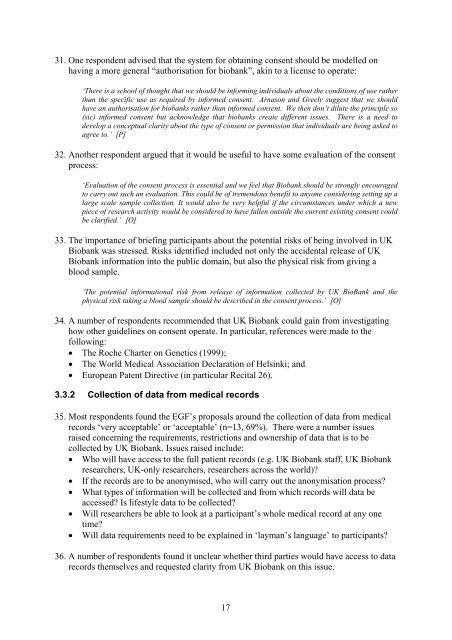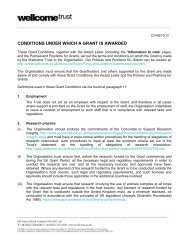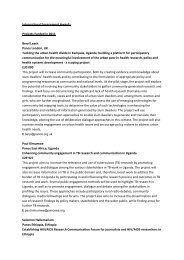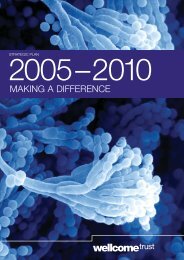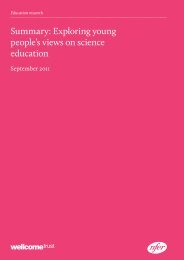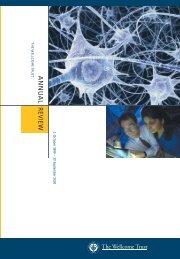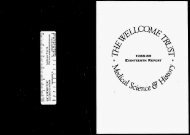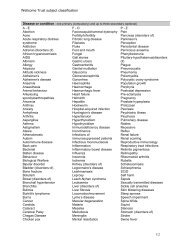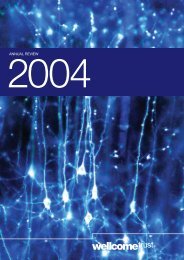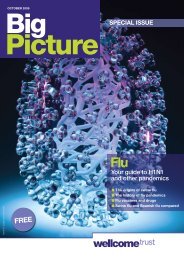UK BIOBANK Ethics and Governance Framework ... - Wellcome Trust
UK BIOBANK Ethics and Governance Framework ... - Wellcome Trust
UK BIOBANK Ethics and Governance Framework ... - Wellcome Trust
Create successful ePaper yourself
Turn your PDF publications into a flip-book with our unique Google optimized e-Paper software.
31. One respondent advised that the system for obtaining consent should be modelled onhaving a more general “authorisation for biobank”, akin to a license to operate:‘There is a school of thought that we should be informing individuals about the conditions of use ratherthan the specific use as required by informed consent. Arnason <strong>and</strong> Greely suggest that we shouldhave an authorisation for biobanks rather than informed consent. We then don’t dilute the principle so(sic) informed consent but acknowledge that biobanks create different issues. There is a need todevelop a conceptual clarity about the type of consent or permission that individuals are being asked toagree to.’ [P]32. Another respondent argued that it would be useful to have some evaluation of the consentprocess:‘Evaluation of the consent process is essential <strong>and</strong> we feel that Biobank should be strongly encouragedto carry out such an evaluation. This could be of tremendous benefit to anyone considering setting up alarge scale sample collection. It would also be very helpful if the circumstances under which a newpiece of research activity would be considered to have fallen outside the current existing consent couldbe clarified.’ [O]33. The importance of briefing participants about the potential risks of being involved in <strong>UK</strong>Biobank was stressed. Risks identified included not only the accidental release of <strong>UK</strong>Biobank information into the public domain, but also the physical risk from giving ablood sample.‘The potential informational risk from release of information collected by <strong>UK</strong> BioBank <strong>and</strong> thephysical risk taking a blood sample should be described in the consent process.’ [O]34. A number of respondents recommended that <strong>UK</strong> Biobank could gain from investigatinghow other guidelines on consent operate. In particular, references were made to thefollowing:• The Roche Charter on Genetics (1999);• The World Medical Association Declaration of Helsinki; <strong>and</strong>• European Patent Directive (in particular Recital 26).3.3.2 Collection of data from medical records35. Most respondents found the EGF’s proposals around the collection of data from medicalrecords ‘very acceptable’ or ‘acceptable’ (n=13, 69%). There were a number issuesraised concerning the requirements, restrictions <strong>and</strong> ownership of data that is to becollected by <strong>UK</strong> Biobank. Issues raised include:• Who will have access to the full patient records (e.g. <strong>UK</strong> Biobank staff, <strong>UK</strong> Biobankresearchers, <strong>UK</strong>-only researchers, researchers across the world)?• If the records are to be anonymised, who will carry out the anonymisation process?• What types of information will be collected <strong>and</strong> from which records will data beaccessed? Is lifestyle data to be collected?• Will researchers be able to look at a participant’s whole medical record at any onetime?• Will data requirements need to be explained in ‘layman’s language’ to participants?36. A number of respondents found it unclear whether third parties would have access to datarecords themselves <strong>and</strong> requested clarity from <strong>UK</strong> Biobank on this issue.17


